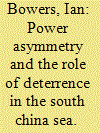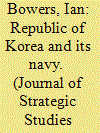| Srl | Item |
| 1 |
ID:
179510


|
|
|
|
|
| Summary/Abstract |
Fourth Industrial Revolution technologies and their applicability at sea now dominate debates about the future of naval operations. This article examines the extent to which such technologies, including autonomous and unmanned weapon systems and artificial intelligence, will disrupt naval warfare. Using two case studies, the South China Sea and the Baltic Sea, this article finds that in the key operational output of attaining sea control these technologies will not disrupt naval warfare. While they may intensify the competition between the operational attributes of detection, stealth, range and lethality, they will ultimately sustain existing understandings of seapower and its strategic effects.
|
|
|
|
|
|
|
|
|
|
|
|
|
|
|
|
| 2 |
ID:
156477


|
|
|
|
|
| Summary/Abstract |
China’s coercive activities in the South China Sea have resulted in a lively
academic debate regarding strategies to deter Beijing and maintain the status quo.
However, much of this literature has been dominated by the U.S.–China dynamic
and has neglected the vital role of the littoral states in the region. This article,
through the lens of a maritime strategic environment, deals with the potential for the
littoral nations of the South China Sea to deter China. It argues that conventional
deterrence by denial is a difficult but applicable strategy despite the substantial
power asymmetry that exists between China and the littoral states in the region.
However, such a deterrent approach must be tailored to the specific, non-existential
challenges that China poses in the region. Among these challenges, this article
examines deterrence within the context of China’s claim to the Spratly Islands and
expansive claims to economic exploitation rights. A maritime strategic environment
provides multiple avenues to impose cost on a superior power and the littoral states
in the region have invested heavily in naval capabilities. However, as this article
finds, it remains to be seen if the littoral states in the region have the technical
capability or political will to successfully enact such a deterrent strategy.
|
|
|
|
|
|
|
|
|
|
|
|
|
|
|
|
| 3 |
ID:
132886


|
|
|
|
|
| Publication |
2014.
|
| Summary/Abstract |
Understanding the development of Republic of Korea (ROK) seapower is central in exploring the evolution and nature of its security consciousness. This article aims to examine how the wider East Asian maritime sphere has influenced ROK perceptions of its own security and how such perceptions have come into conflict with the needs of maintaining its deterrent capabilities within the peninsular context. In doing so it concludes that for the ROK seapower has been an expression of wider engagement and international developing security concerns but that it is curtailed and influenced by the realities of the threat from the North.
|
|
|
|
|
|
|
|
|
|
|
|
|
|
|
|
| 4 |
ID:
164485


|
|
|
|
|
| Summary/Abstract |
This article uses hybrid warfare as a framework for examining North Korean operations on the Korean Peninsula and the South Korean reaction to such operations. It argues that North Korea has long employed a hybrid approach to achieve a wide number of political and strategic objectives. However, the deterrence-based strategic reality on the Korean Peninsula in combination with North Korea’s increasing relative weaknesses has rendered this approach self-defeating.
|
|
|
|
|
|
|
|
|
|
|
|
|
|
|
|